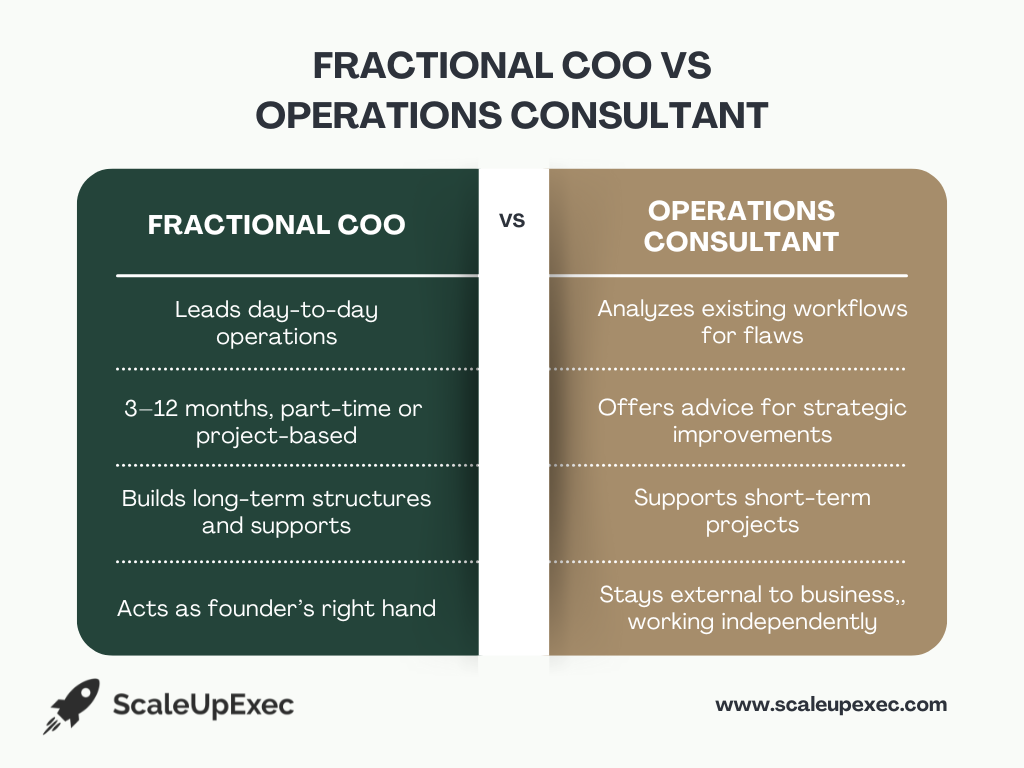As your business grows in complexity, it becomes critical to bring in the right type of operational support. Two common options are the Fractional COO and the Operations Consultant. While both roles are designed to improve performance, their approach, level of involvement, and long-term impact are fundamentally different.
Understanding how these roles compare will help you determine which one best fits your current needs—and when it may make sense to use both.
What Is a Fractional COO?
A fractional Chief Operating Officer (COO) is an experienced executive who joins your leadership team on a part-time basis, which is often 1 to 4 hours per day. Their primary role is to manage day-to-day operations and to strategize the necessary steps to execute the vision of the company. Fractional COOs build internal systems, drive accountability, and help scale the business sustainably.
Though not full-time, a fractional COO often becomes deeply embedded in the company. They are responsible for outcomes, manage teams directly, and are often instrumental in establishing the rhythm and structure needed for long-term success.
What Is an Operations Consultant?
An operations consultant offers short-term, external support with a focus on diagnosing issues and recommending improvements. They specialize in analyzing workflows, focusing on team efficiency, and identifying opportunities to improve performance or reduce costs.
In many cases, a fractional COO is the one who brings a consultant in. The COO looks at the bigger picture, defines the priorities, and if a specific expertise gap is identified, engages a consultant to support a targeted initiative.
Consultants provide objective insights. They typically do not take ownership of implementation or manage teams. Their role is to deliver recommendations through audits, assessments, or strategic workshops. From there, the COO remains accountable for ensuring the advice is relevant, implementable, and fully integrated into the company’s operational strategy.
Key Differences Between the Two

- Scope: A fractional COO owns execution and outcomes; a consultant provides strategic guidance and analysis.
- Duration: Fractional COOs engage long-term (though part-time). Consultants are brought in for defined, shorter-term projects.
- Involvement: Fractional COOs operate as part of your leadership team. Consultants remain external advisors.
- Cultural Integration: COOs must align with company culture to lead effectively. Consultants maintain independence.
When to Hire a Fractional COO
A fractional COO is ideal when your business is growing quickly and needs systems, structure, and stronger leadership to scale. They help implement processes, manage performance, and bring clarity to cross-functional teams while freeing up the founder to focus on strategy.
If your internal team lacks accountability, structure, or direction—or if you’re running day-to-day operations yourself—a fractional COO can take ownership and drive real change. This role is especially useful during transition periods or as a bridge until a full-time executive hire is warranted.
When to Bring in an Operations Consultant
If you’re facing a specific challenge, like supply chain delays, process inefficiencies, or unclear workflows, a consultant can provide an unbiased, expert assessment and recommend actionable improvements.
Consultants are also useful for operational audits, performance reviews, or implementation of new technologies. Their recommendations may lead to internal changes that require ongoing oversight, at which point a COO might step in to manage those changes long-term.
Can They Work Together?

Absolutely. Many companies use both. A consultant may diagnose problems, while a fractional COO builds the solutions into your day-to-day operations. Alternatively, a fractional COO may bring in a specialist consultant for targeted help on specific initiatives like system migrations or logistics optimization.
When used together, these roles can complement one another, as long as expectations, scope, and ownership are clearly defined.
Real-World Scenarios
- Founder Overload: A startup founder is overwhelmed managing a fast-growing team. A fractional COO steps in to take over operations and instill structure.
- Process Breakdown: A company experiences frequent delays in order fulfillment. A consultant conducts an audit and recommends changes to the supply chain and inventory process.
- Execution Gap: A startup is clear on vision but unclear on execution. A consultant defines the roadmap; a fractional COO owns the implementation.
Final Thoughts: Match the Role to the Moment
Choosing between a fractional COO and an operations consultant depends on your current challenges, your internal team’s bandwidth, and the kind of support you need. If you’re looking for someone to lead, implement, and stay accountable, a fractional COO is likely the better fit. If you need specialized expertise or a fresh diagnostic lens, a consultant may be the right starting point.
In many cases, the smartest path begins with a COO. They assess the business holistically, define what truly needs to be tackled, and when needed, bring in consultants to solve for specific gaps. Throughout, the COO ensures that any external guidance aligns with your broader strategy and operational model. In other scenarios, both roles may run side-by-side, with the COO anchoring execution.
Schedule a Discovery Call to explore which option best supports your next stage of growth.






